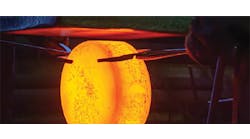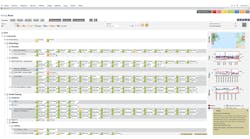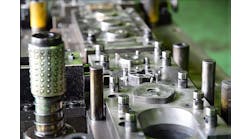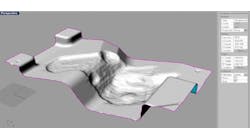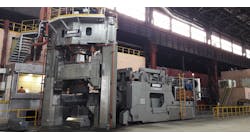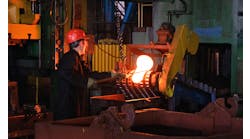By Josh Cole and Andrew Callaghan, CPIM
Implementing enterprise resource planning (ERP) software or upgrading an existing ERP system can dramatically enhance the way a company manages its resources and business processes. However, for forging operations and other metal manufacturing businesses ERP implementations often pose difficult challenges – and frequently they produce less than satisfactory results.
To understand why ERP implementations in forging operations may fall short of expectations – and how to overcome such challenges – it’s useful first to determine what these businesses want to achieve through ERP, and what must be accomplished in order for an investment in this technology to be considered successful.
Adding value to the business
ERP systems are considered “one of the core business applications of most companies above a minimum complexity,” according to Gartner Inc., the research company that is credited with coining the term ERP in the early 1990s. Gartner defines ERP as “a technology strategy in which operational business transactions are linked to financial transactions, specifically general ledger transactions.”1
In addition to traditional back-office functions such as finance, procurement, and human resources, a well-implemented ERP system will incorporate a full range of operational transactions such as sales and order management, customer service, inventory management, product life-cycle management, and the management of the manufacturing or distribution facilities themselves.
So how does all this translate into a benefit for the forging operator? To be worthwhile, any investment in technology should add value by cutting costs, enhancing revenue, mitigating risk, or improving asset utilization – that is, how effectively the business employs its human and capital resources. An investment in ERP can add value in all four of these areas:
1. Improved asset utilization. A well-designed and efficiently implemented ERP system automates data gathering and, ideally, reduces the need for “firefighting.” As a result, more resources are available for analysis, customer service, innovation, and other value-adding activities. Utilization of capital assets, such as equipment and machinery, is enhanced too, thanks to advanced scheduling and planning features that help increase throughput and decrease downtime.
2. Reduced cost. An effective ERP system not only helps implement industry best practices that can improve overall productivity and efficiency, it also automates many costly data gathering and reporting processes. And, improved quality helps to reduce returns and rework, while improved shipping and supplier relationships provide additional cost savings.
3. Increased revenue. A well-functioning ERP system helps streamline product development cycles and helps a business analyze profitability by individual product line faster and more accurately. This makes it possible to scale and grow the business more readily. Improved performance and predictability also help to increase customer satisfaction.
4. Reduce risk. Increased adaptability and responsiveness are important risk-mitigating features as they help a business adapt to changing market conditions more efficiently. ERP systems also help streamline data gathering and reporting, improve organization-wide visibility, simplify regulatory compliance, and provide better financial controls and segregation of duties.
Forgers’ unique ERP challenges
In spite of ERP’s potential benefits, it’s likely that most forging plant operators think ERP will be an expensive, difficult, and complicated implementation. Often, that is the result of past experiences.
Most failed ERP implementations occur because the system or the company itself was not well prepared. In many cases, not enough time was taken to scope, plan, and estimate the implementation project, and not enough thought was given to the state of the business once the implementation was complete.
Beyond those general observations, it is possible to pinpoint a number of critical factors that are unique to forging operations and pose specific challenges to implementing ERP successfully.
For example, unlike manufacturers that build an end product by assembling components from a bill of materials, a forging operation is fundamentally different: it takes a single input – an ingot, billet, bar, or other profile – and reshapes it into one or more products. Dimensional transformations resulting from processes such as drawn, upset, squeezed, and press forging are fundamental to forging, so the ability to view and manage inventory by shape and dimension is critical.
An effective ERP system for a forging operation also must be capable of tracing to specific furnace lots where forgings were heat-treated. “One-to-many” processes are not always well accommodated by ERP solutions that are designed primarily for “many-to-one” assembly type operations.
In addition, like all metal manufacturers, a forging operator must accommodate customer specifications that often are unique to one-time orders. Due to the nature of the work process and materials, it can be very difficult, if not impossible, to eliminate batch-to-batch production variables. Furthermore, many forging processes operate within thin margins of tolerance, with carefully controlled sequences and quality checks that must be fine-tuned to exact specifications.
Also, an effective ERP solution for a forging operation must be capable of tracking and managing inventory from original heat to end product, with weight, heat properties, dimensions, and other physical and chemical attributes that can differ by lot, while also offering supply chain-level tracking by heat and lot.
In addition to these specific technical requirements, the forging operator faces the same pressures as all manufacturers, including the need for cost containment, supply chain management, and efficient business systems, as well as the constant need to minimize scrap; control freight costs; and anticipate price fluctuations. Here again, a forging operation poses particular ERP challenges during times of volatile commodity prices.
In recent years, this already complex picture has been complicated further by some of today’s continuous-improvement methodologies, such as lean manufacturing. Just-in-time inventory management, Kanban systems, and other lean components add more requirements that the ERP solution must support. This means that to remain effective for a forging operator an ERP solution must offer great flexibility, along with the capability to adapt and upgrade quickly. Trying to force an ERP system to address these many issues – issues it was not designed to accommodate – is like forcing a square peg into a round hole.
The state of the industry
Because of these challenges some forging operators, and other metals manufacturers, too, have been slow to take full advantage of what advanced ERP systems have been accomplishing in other industries. Fortunately, as they prepare to implement or upgrade their ERP solutions today, these forgers might find the industry is becoming more attuned to their needs.
In December 2010, Gartner released its most recent Magic Quadrant study of the ERP market for “product-centric midmarket companies.” These are defined as manufacturers or distributors with annual revenues between $50 million and $1 billion, a description that will encompass most independent forging operations.
According to Gartner, while the ERP market overall declined by 6% in 2009, the decline for this midmarket segment was just 1%, which indicates "even during the recession, the midmarket was still relatively active in buying ERP solutions."1
Gartner's study reviewed the strengths and weaknesses of 14 competing ERP software solutions, evaluating them according to a broad range of criteria. These criteria include current product and service capabilities, overall viability, sales execution and pricing, market responsiveness and track record, product strategy, and customer experience, along with the software provider's understanding of buyers' wants and needs, and ability to meet its commitments.
Then, based on their performance against these criteria, the solutions are grouped into four categories: leaders, visionaries, challengers, and niche players. Of the 14 ERP software platforms evaluated, Gartner concluded only two offerings qualify as leaders: SAP Business All-in-One and Microsoft Dynamics AX.
Of these two, experience shows that Microsoft Dynamics AX is particularly well suited to metals manufacturing, including forging operators. Microsoft's development strategy supports joint innovation by independent partners who develop industry-specific accelerators, which then can be configured to meet the very specific needs of a particular operation. For a specialized business like forging, this can be an advantage.
In addition, users find the familiar Microsoft user interface easy to learn and adapt to, and the program integrates smoothly with other widely used Microsoft business programs.
Finding the right fit
Regardless of the vendor you choose, implementing or upgrading your ERP system can significantly improve operations in a forging business, provided the system you install is capable of meeting certain minimum requirements.
The ERP system should be capable of tracking and managing inventory by serial or tag number, with weight, heat properties, dimensions, and other attributes that can differ by lot. Not all ERP systems are up to this challenge – certainly not those offering “out-of-the-box” solutions.
Since material must be traceable from original heat to end product, the system also should be capable of automatically triggering quantitative and qualitative testing at any point in the production process, and be able to automatically print material test reports with detailed chemistry test results if needed.
Freight management is critical in forging, too, so the ERP system should support efficient scheduling of carriers and optimizing of truck or railcar capacity.
Other desirable, industry-specific capabilities include:
• Customer specification management;
• Multidimensional inventory and lotattribute tracking;
• Accommodation of both buy-sell and toll-processing sales;
• Pricing updates that reflect market fluctuations;
• Integrated subcontracting capabilities;
• Combined production and quality reporting and validation by operation;
• Unit of measure conversions to flexibly track theoretical and actual weight; and
• Industry-tailored travelers, identification tags, and shipping labels.
Most important, the ERP system should integrate smoothly with other business systems including finance, accounting, human resources, procurement, and sales and customer management. It should also offer integrated regulatory support, including compliance with the Sarbanes-Oxley Act for registrants with the Securities and Exchange Commission.
Finally, the system should be scalable, flexible, and adaptable as the company grows. Ideally, you begin with the functions you need immediately and unlock additional capabilities as needs change, without having to undergo disruptive and costly revamping of the ERP solution. This not only minimizes implementation risks, it reduces the system’s total long-term cost of ownership.
A robust ERP system can improve visibility of the entire forging business, from materials acquisition to testing and certification, and on through the production, shipping, and billing cycles. Properly chosen and implemented, it also helps improve productivity and product quality, and provides managers with timely and accurate information to enhance operations, sales, and profitability.
1. Christian Hesterman, Chris Pang and Nigel Montgomery, “Magic Quadrant for ERP for Product-Centric Midmarket Companies,” Gartner Inc., Dec. 17, 2010
| Josh Cole is a partner with Crowe Horwath LLP in Grand Rapids, MI. Contact him at 616-481-6565 or [email protected]. Andrew Callaghan is with Crowe Horwath LLP in Nashville. Contact him at 615-310-0531 or [email protected]. |
